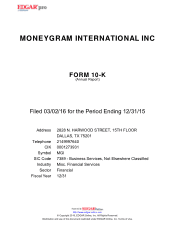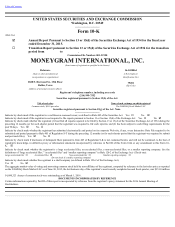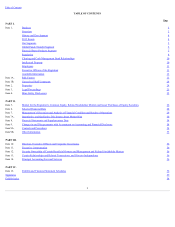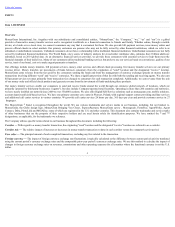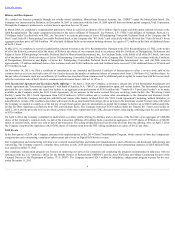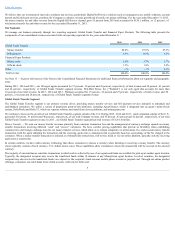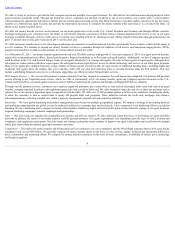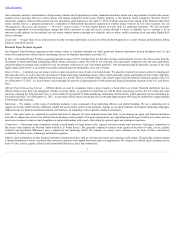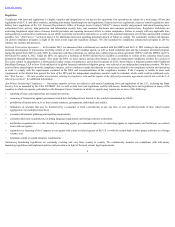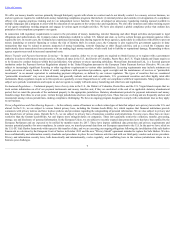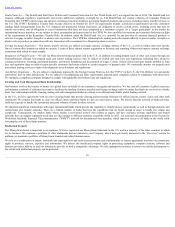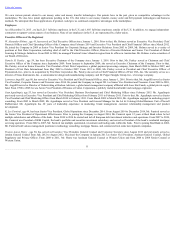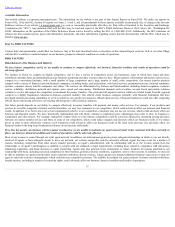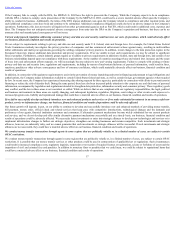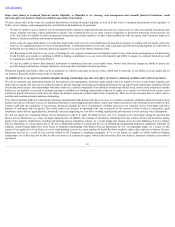MoneyGram 2015 Annual Report Download - page 10
Download and view the complete annual report
Please find page 10 of the 2015 MoneyGram annual report below. You can navigate through the pages in the report by either clicking on the pages listed below, or by using the keyword search tool below to find specific information within the annual report.
Table of Contents
We offer our money transfer services primarily through third-party agents with whom we contract and do not directly control. As a money services business, we
and our agents are required to establish anti-money laundering compliance programs that include: (i) internal policies and controls; (ii) designation of a compliance
officer; (iii) ongoing employee training and (iv) an independent review function. We have developed an anti-money laundering training manual available in
multiple languages and a program to assist with the education of our agents on the various rules and regulations. We also offer in-person and online training as part
of our agent compliance training program and engage in various agent oversight activities. We have also adopted a global compliance policy that outlines key
principles of our compliance program to our agents.
In connection with regulatory requirements to assist in the prevention of money laundering, terrorist financing and other illegal activities and pursuant to legal
obligations and authorizations, the Company makes information available to certain U.S. federal and state, as well as certain foreign government agencies when
required by law. In recent years, the Company has experienced increasing data sharing requests by these agencies, particularly in connection with efforts to prevent
money laundering or terrorist financing or reduce the risk of identity theft. In certain cases, the Company is also required by government agencies to deny
transactions that may be related to persons suspected of money laundering, terrorist financing or other illegal activities, and as a result the Company may
inadvertently deny transactions from customers who are making legal money transfers, which could lead to liability or reputational damage. Responding to these
agency requests may result in increased operational costs.
MoneyTransferandPaymentInstrumentLicensing—In most countries, either we or our agents are required to obtain licenses or to register with a government
authority in order to offer money transfer services. Almost all states in the U.S., the District of Columbia, Puerto Rico, the U.S. Virgin Islands and Guam require us
to be licensed to conduct business within their jurisdictions. Our primary overseas operating subsidiary, MoneyGram International Ltd., is a licensed payment
institution under the Payment Services Regulations adopted in the United Kingdom pursuant to the European Union Payment Services Directive. We are also
subject to increasingly significant licensing or other regulatory requirements in various other jurisdictions. Licensing requirements may include minimum net
worth, provision of surety bonds or letters of credit, compliance with operational procedures, agent oversight and the maintenance of reserves or “permissible
investments” in an amount equivalent to outstanding payment obligations, as defined by our various regulators. The types of securities that are considered
“permissible investments” vary across jurisdictions, but generally include cash and cash equivalents, U.S. government securities and other highly rated debt
instruments. Many regulators require us to file reports on a quarterly or more frequent basis to verify our compliance with their requirements. Many regulators also
subject us to periodic examinations and require us and our agents to comply with anti-money laundering and other laws and regulations.
EscheatmentRegulations—Unclaimed property laws of every state in the U.S., the District of Columbia, Puerto Rico and the U.S. Virgin Islands require that we
track certain information on all of our payment instruments and money transfers and, if they are unclaimed at the end of an applicable statutory abandonment
period, that we remit the proceeds of the unclaimed property to the appropriate jurisdiction. Statutory abandonment periods for payment instruments and money
transfers range from three to seven years. Certain foreign jurisdictions also have unclaimed property laws. These laws are evolving and are frequently unclear and
inconsistent among various jurisdictions, making compliance challenging. We have an ongoing program designed to comply with escheatment laws as they apply
to our business.
PrivacyRegulationsandDataSharingRequests—In the ordinary course of business we collect certain types of data that subject us to privacy laws in the U.S. and
abroad. In the U.S., we are subject to various federal privacy laws, including the Gramm-Leach-Bliley Act, which requires that financial institutions provide
consumers with privacy notices and have in place policies and procedures regarding the safeguarding of personal information. We are also subject to privacy and
data breach laws of various states. Outside the U.S., we are subject to privacy laws of numerous countries and jurisdictions. In some cases, these laws are more
restrictive than the Gramm-Leach-Bliley Act and impose more stringent duties on companies. These laws generally restrict the collection, transfer, processing,
storage, use and disclosure of personal information. In the European Union, we are subject to recently enacted data protection laws that have been ratified by the
European Parliament and are expected to be ratified by member states by 2017. These laws impose additional data protection and privacy requirements and
increase potential penalties for non-compliance. In certain cases, we transfer personal data from our European operations to the U.S. In the past we have relied on
the U.S.-EU Safe Harbor framework with respect to this transfer of data, and we are assessing our ongoing obligations following the invalidation of the safe-harbor
framework in a decision by the European Court of Justice in October 2015 and the new "Privacy Shield" agreement intended to replace the Safe Harbor. We also
have confidentiality and information security standards and procedures in place for our business activities and with our third-party vendors and service providers.
Privacy and information security laws, both domestically and internationally, evolve regularly, and conflicting laws in the various jurisdictions where we do
business pose challenges.
9

